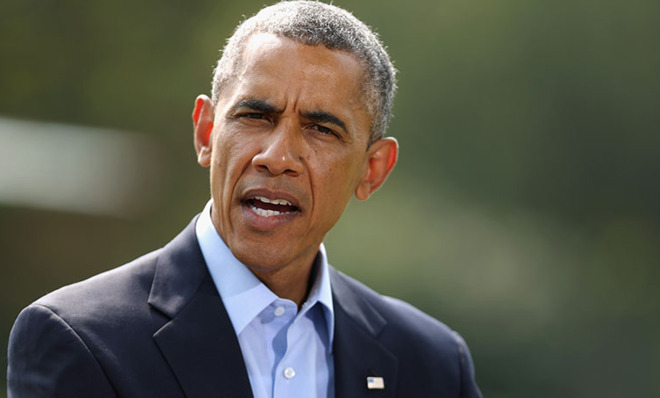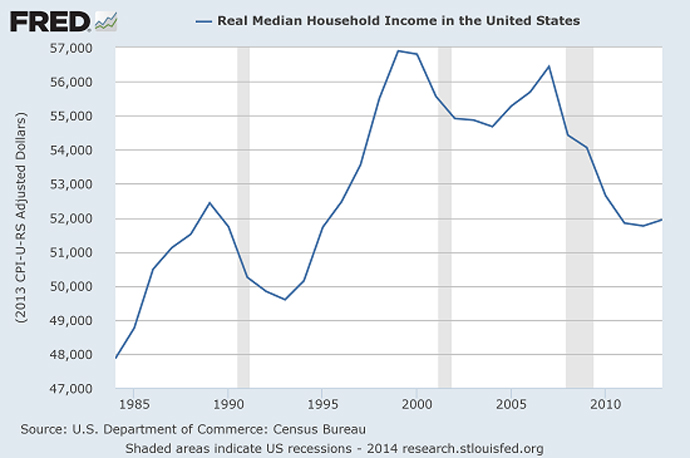Why the U.S. voted against Obama's economy
Apologies to James Carville, but it’s still the economy, stupid

A free daily email with the biggest news stories of the day – and the best features from TheWeek.com
You are now subscribed
Your newsletter sign-up was successful

More than a week after the Republican election "wave" saw GOP capture the Senate, expand its majority in the House to levels not seen since the 1940s, expand its control of governorships, and attain a level of power within the state legislatures not seen since the 1920s, a big question is still being tossed around by pundits, political operatives and investors: What does it all mean?
Some believe the election was a repudiation of President Obama's leadership style as well as Democratic policies. Before the election, Obama himself had said his "policies are on the ballot," as numerous campaign ads pointed out. Yet after the midterms, Obama tried to control the damage by saying he interpreted the results as a vote against the gridlock and partisanship we've seen over the last few years.
Others on the left go further, saying that Democratic policies such as marijuana and the minimum wage won despite the GOP's gains, and that voters — the ones that turned out — just didn't give Obama credit for the economic gains we've seen. These include an unemployment rate that has now fallen to 5.8 percent — a level not seen since the summer of 2008, as well as a stock market pushing to record highs and the best run of payroll creation since the dotcom boom.
The Week
Escape your echo chamber. Get the facts behind the news, plus analysis from multiple perspectives.

Sign up for The Week's Free Newsletters
From our morning news briefing to a weekly Good News Newsletter, get the best of The Week delivered directly to your inbox.
From our morning news briefing to a weekly Good News Newsletter, get the best of The Week delivered directly to your inbox.
The problem is that beneath these shiny headline numbers is the down-in-the-dirt truth that Middle America is still hurting. Apologies to James Carville, but it’s still the economy, stupid. Let's look at some major elements of the "recovery" to date:
Stocks
Yes, U.S. large-cap stocks have never been higher, thanks mainly to the injections of cheap money by the Federal Reserve. And that has unarguably boosted household wealth in this country. The problem is that wealth is increasingly concentrated among the top 1 percent while everyone else looks enviously in on the action.
According to the latest Federal Reserve Survey of Consumer Finances, the average value of financial assets held by those in the middle 20 percent in term of income was $78,300 (vs. $1,616,000 for the top 10 percent in terms of income). So the benefits of the rise in the Dow has been concentrated at the top, a problem that Fed Chair Janet Yellen herself has commented on.
A free daily email with the biggest news stories of the day – and the best features from TheWeek.com
Unemployment
It is true there has been great progress in bringing down the unemployment rate. In fact, it's falling faster than many envisioned, nearly hitting the Fed's year-end 2015 forecast of 5.4 percent to 5.6 percent almost a year ahead of schedule. But what's missing in this has been the collapse in the civilian labor force participation rate to levels not seen since 1978 as people have dropped out of the job market. There are many reasons for this, including apathy, obsolete, or inadequate skills, and old age.
Yet the end result is the same: Not only are three million fewer Americans working full time than in 2007, but as a share of the population, full-time employment is languishing down near early 1980s levels.
Jobs
While recent payroll gains have been strong, totaling an average of 240,000 per month in the five months to October, with another 214,000 gained last month, this is masking the fact that many of the job gains are of relatively low quality, such as bar and restaurant jobs. You know things aren't good when the prices of vices like prostitution, drugs, gambling, and alcohol are on the way down.

The easiest and quickest way to realize that Obama's economic recovery hasn't benefited middle-class families as much as the headline economic figures suggest is to simply look at the chart of inflation-adjusted median household income. This is arguably the single most important economic indicator and really sums up the on-the-ground reality for working families. Yes, stocks are up. Yes, unemployment is down. Yes, jobs are being created. And yes, oil prices have come down too.
None of this really matters unless it all can combine to lift wages and lower the cost of living. Right now, incomes are down nearly 9 percent from their highs in the late 1990s and have fallen about 4 percent since Obama took office.
Until this measure improves, the electorate will be restless.
There is some evidence that a turnaround could be coming soon. In a recent column, I outlined the growing evidence that a surge of wage inflation could be on the horizon. This assumes that the economic momentum that we've seen in recent years continues. The unemployment rate has dropped down to level that, in the recent past, have been associated with a pickup in the pace of wage gains.
My hope is that Obama and the Republicans in Congress can keep the momentum going by removing regulatory roadblocks to hiring — such as the full-time provisions of Obamacare and extending tax breaks to small businesses expanding their workforces — to help facilitate this. The worst of all outcomes would be the return of bitter partisan gridlock, a loss of economic confidence, and the stalling of job gains just as Americans were about to enjoy a lift in take-home pay for the first time in years.
More from The Fiscal Times...
-
 Magazine solutions - February 27, 2026
Magazine solutions - February 27, 2026Puzzle and Quizzes Magazine solutions - February 27, 2026
-
 Magazine printables - February 27, 2026
Magazine printables - February 27, 2026Puzzle and Quizzes Magazine printables - February 27, 2026
-
 ‘The forces he united still shape the Democratic Party’
‘The forces he united still shape the Democratic Party’Instant Opinion Opinion, comment and editorials of the day
-
 The billionaires’ wealth tax: a catastrophe for California?
The billionaires’ wealth tax: a catastrophe for California?Talking Point Peter Thiel and Larry Page preparing to change state residency
-
 Bari Weiss’ ‘60 Minutes’ scandal is about more than one report
Bari Weiss’ ‘60 Minutes’ scandal is about more than one reportIN THE SPOTLIGHT By blocking an approved segment on a controversial prison holding US deportees in El Salvador, the editor-in-chief of CBS News has become the main story
-
 Has Zohran Mamdani shown the Democrats how to win again?
Has Zohran Mamdani shown the Democrats how to win again?Today’s Big Question New York City mayoral election touted as victory for left-wing populists but moderate centrist wins elsewhere present more complex path for Democratic Party
-
 Millions turn out for anti-Trump ‘No Kings’ rallies
Millions turn out for anti-Trump ‘No Kings’ ralliesSpeed Read An estimated 7 million people participated, 2 million more than at the first ‘No Kings’ protest in June
-
 Ghislaine Maxwell: angling for a Trump pardon
Ghislaine Maxwell: angling for a Trump pardonTalking Point Convicted sex trafficker's testimony could shed new light on president's links to Jeffrey Epstein
-
 The last words and final moments of 40 presidents
The last words and final moments of 40 presidentsThe Explainer Some are eloquent quotes worthy of the holders of the highest office in the nation, and others... aren't
-
 The JFK files: the truth at last?
The JFK files: the truth at last?In The Spotlight More than 64,000 previously classified documents relating the 1963 assassination of John F. Kennedy have been released by the Trump administration
-
 'Seriously, not literally': how should the world take Donald Trump?
'Seriously, not literally': how should the world take Donald Trump?Today's big question White House rhetoric and reality look likely to become increasingly blurred